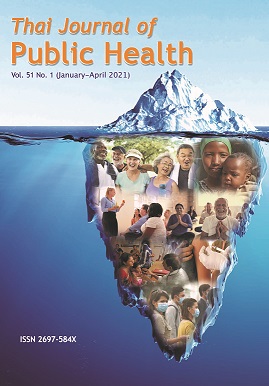Effects of a Health Promotion Program on Perceived Self-Efficacy and Outcome Expectations on Self-Care among Elderly with Hypertension, Chiang Rai Province, Thailand
Keywords:
elderly with hypertension, perceived self-efficacy, outcome expectationsAbstract
The elderly with hypertension have different limitations regarding health care as well as limited self-reliance. Moreover, some have complications, such as stroke and kidney disease. Therefore, they require the best-fit health promotion for their well-being and good quality of life. The objective of this quasi-experimental research was to examine the effect of a health promotion program on perceived self-efficacy and outcome expectations on self-care among elderly with hypertension. Such a health promotion program was created by applying the self-efficacy theory of Bandura, which states that an individual can control their thoughts, motivations and actions that arise through self-training involved with self-observation, decision making and self-reaction. If an individual has the expectation or believes in their own potential by knowing what to do and anticipating the expected outcomes, their actions will follow the self-efficacy, which would predict or decide that the individual will change their behavior and follow the instructions continuously. Therefore, suitable self-care promotion for the elderly with hypertension would change their routine and behavior appropriately so that their blood pressure can be controlled constantly. The study participants were elderly who lived in Nang Lae sub-district, Mueang district, Chiang Rai province, Thailand. All had been diagnosed with hypertension. Participants were divided into two groups, the experimental group and the comparison group, with 30 people per group. The experimental group attended a 2.5hour health promotion program once a week for 6 weeks, whereas the comparison group followed the normal health promotion program from Nang Lae Health Promoting Hospital. Data regarding general information, perceived self-efficacy, and outcome expectations on self-care were collected using questionnaires that were developed by the researchers. The Indices of Item - Objective Congruence (IOC) of the questionnaires were 0.88 and Health Promotion Program were 0.93, respectively, while the reliability using Cronbach’s alpha coefficient was 0.78. Data were analyzed by using descriptive statistics and inferential statistics, namely the paired sample t-test and independent t-test. Research was conducted during a period from September to November 2019. The primary researcher conducted the training and performed data collection. The results indicated that perceived self-efficacy and the outcome expectations on self-care of the experimental groups after having the health promotion program were higher than before the implementation of the program (p <0.001). Moreover, the experimental group had higher perceived self-efficacy and expectations of self-care than the comparison group (p <0.001). This research suggests that health promotion helps improve the perception of self-care ability and expectations of the outcomes of self-care behavior for elderly patients. Therefore, it is advised that the health promotion program from this research is practical for application as a guideline for arranging the health promotion activities for the elderly who have similar conditions. The relevant agencies should also continually conduct the follow-up and health condition assessments.
References
Department of Older Persons. Official statistics of the registration systems an
Department of Local Administration. Elders Statistics 77. Available from: http://www.dop.go.th/th/know/1/51, accessed December 30, 2019.
Nuget B, Porntaweekantha P. Nursing care for the elderly. 3rd ed. Nonthaburi:
Academic Welfare Program Praboromarajchanok Institute; 2007.
Health Systems Research Institute. The 5th Survey report on Thai population health
from health check report 2014. Nonthaburi: Health systems research institute; 2014.
Ministry of Public Health. Report of the population standard in Chiang Rai province:
Hypertension morbidity. Available from: https://hdcservice.moph.go.th, accessed January 7, 2019.
Thai Hypertension Society. 2019 Thai guidelines on the treatment of hypertension.
Chiang Mai: Trickthink; 2019.
Bandura A. A self-efficacy: The exercise of control. New York: W.H. Freeman;
Kaewkangwan J, Singhasiwanon P. Size of sample group for clinical research. In:
Pitisuthithwm P, Pichiansoonthorn C, eds. Clinical Research Textbook. Bangkok : Faculty of Tropical Medicine, Mahidol University; 2011. P. 107-44.
Bloom BS, Madaus GF, Hastings JT. Handbook on formative and summative
evaluation of student learning. New York: McGraw-Hill; 1971.
Orawan N, Prasertchai A. Results of a health promotion program on the health
behavior of the elderly in Nonthaburi. Rachaphruek Journal 2015; 13(1): 36-45.
Supreme Patriarch Nyanasanwara Institute of Geriatric Medicine: Department of
Medical Services, Ministry of Public Health. Self-care manual for hypertension in elderly. Chonburi: Beyondsolutions Company Limited; 2011.
Sittiporn S. Factors affecting self-care behavior of patients with hypertension in Bor Fai
community, Hua Hin sub-district, Hua Hin district, Prachuab Khiri Khan. Hua Hin Sook Jai Klai Kangwon Journal 2016; 1(1): 85-97.
Sunantha S. Results of self-performance promotion program for health behavior
adjustment of elderly with hypertension, Public Health Center 19, Wong Sawang, Bangkok. Journal of the Faculty of Physical Education 2012; 15 (Special Edition): 308-15
Wichaya H, Thadsaeng B, Kitisri M, Waiyaka C. Results of self-management
promotion program on self-management behavior and blood pressure value of elderly with hypertension. Nursing Journal 2017; 44 (Special 2): 1 - 11.
Downloads
Published
Issue
Section
License
Creative Commons License CC-BY-ND


